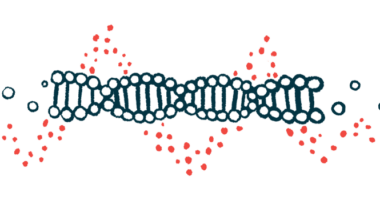MECP2 May Regulate Behavioral Effects of Early Life Stresses

The MECP2 gene — mutations in which cause most cases of Rett syndrome — may be important for encoding early childhood traumas into the genetic wiring of the brain, affecting behaviors, a study in mice suggests.
Titled “MeCP2 haplodeficiency and early-life stress interaction on anxiety-like behavior in adolescent female mice,” the study was published in the Journal of Neurodevelopmental Disorders.
The MECP2 gene provides instructions for making a protein of the same name. The MeCP2 protein is thought to have a number of biochemical functions that collectively help to regulate how DNA is “read,” especially in brain cells, which is critical for normal development.
Of particular note, MeCP2 is known as a regulator of epigenetic modifications in response to stresses during critical periods of development. In less technical terms, MeCP2 can make chemical modifications to the DNA of brain cells that affect the cells’ genetic activity for life — and these modifications may be altered by stressful or traumatic events experienced early in life when the brain is developing, with lifelong consequences.
The details of these processes — and their implications in conditions like Rett syndrome where MECP2 is mutated — remain incompletely understood.
A quartet of scientists in Spain, Portugal, and Germany conducted a series of behavioral tests on mice to gain insight.
The team utilized two genetic groups of mice: a wild-type or normal strain as controls, and one with a mutation in Mecp2 (the mouse version of MECP2). Some mice in both groups were raised normally, while others were subjected to early life stress (by regularly moving young mouse pups to a different cage from their mother in their first few weeks of life).
All the mice used were female; notably, Rett almost exclusively affects girls.
In tests of anxious behavior — specifically the elevated plus maze and open field tests — Mecp2-mutant mice spent significantly more time out in the open than their wild-type counterparts. As scared mice tend to favor nooks and crannies where they can hide, this indicates less anxious behavior in the mice with Mecp2 mutations. The team also found that animals with Mecp2 changes traveled a smaller distance when assessing their locomotor activity.
Early life stress did not significantly affect anxiety-related behaviors among the two genetic groups under standard testing conditions. However, when the elevated plus maze test was done with bright lights — which is especially anxiety-inducing for mice — a significant effect was evident. Mice with early life stress showed significantly less anxiety behaviors compared to counterparts who had not experienced such stress, in both animals with Mecp2 mutations and controls.
In the forced swimming test to evaluate depression, MECP2-mutant mice were significantly less likely than controls to give up and stop swimming, indicating less depressive behavior. There was no difference, however, among the mice that had been exposed to stress early in life.
“This data suggests that [early life stress] induces a change in depressive-like behavior in WT [wild-type] females, and that deficiency of MeCP2 in the [Mecp2-mutant] females per se occludes this phenotype [trait],” the researchers wrote
Analyses of the mice’s brains suggested that early life stress lowers the genetic activity of cells in certain regions that are known to be important for responding to stress and anxiety, with differences between the Mecp2 mutants and controls.
In particular, Mecp2-mutant mice had reduced activity of brain cells that expressed a protein called corticotropin-releasing hormone (CRH). Based on the finding, the researchers noted that biological pathways related to this protein may serve as “a potential entry point for the treatment of anxiety in RTT [Rett syndrome] and related conditions.”
“Overall, our data suggests that a MeCP2-dependent mechanism is involved in controlling neuronal activity in stress-related circuits that are also responsive to” early life stresses, the scientists concluded.
The team noted a need for further research into the mechanisms by which the MeECP2 protein affects anxiety and responses to early trauma.







